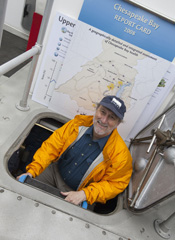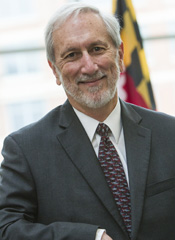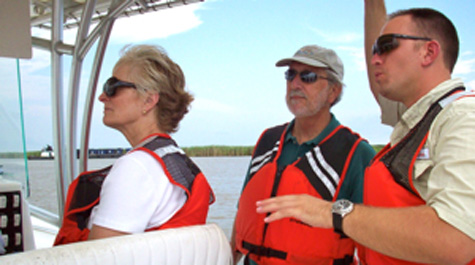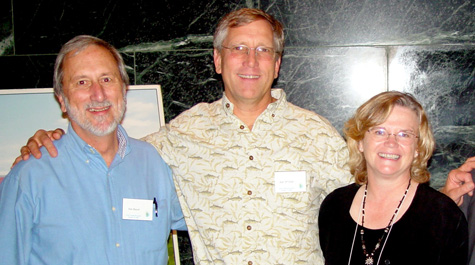VIMS alumnus is longest-serving President of UMCES
Heading up the University of Maryland Center for Environmental Science, serving as Vice Chancellor of the University System of Maryland’s Environmental Sustainability Initiative, and teaching graduate courses would be a lot of work for any accomplished scientist, but for Dr. Donald Boesch, it’s just another day at the office.
A 1971 graduate of the Ph.D. program at the Virginia
Institute of Marine Science, College of William & Mary, Boesch is no
stranger to juggling multiple responsibilities in his career as a biological
oceanographer. Since graduating from VIMS, Boesch has risen through the ranks to
become widely regarded as one of the most respected marine scientists in the
field.

“As President of UMCES, I have multiple obligations,” says Boesch. “My principal responsibility is to direct our Center—which is around the same size as VIMS—but it’s distributed in four different locations across the state, which brings many challenges.”
In addition to his 23-year tenure as President, Boesch also works part-time as the Vice Chancellor for Environmental Sustainability and leads the University System’s Environmental Sustainability Initiative where he looks after the objectives of sustainable options for 12 institutions across Maryland. “As Vice Chancellor I help the institutions respond to educational needs related to environmental sustainability and bring forth faculty expertise,” says Boesch.
With a slew of responsibilities filling his plate on a daily basis, Boesch still makes time for his duties as a professor. “I’ve always been fascinated by the environment and the power science has in uncovering things about how the environment works,” he says. “I enjoy trying to think of ways that knowledge can be put to practical use in society, and passing that knowledge down to my students. That’s what makes me jump out of bed in the morning.”
VIMS Professor of Marine Science Robert (J.J.) Orth met Boesch while they were both pursuing graduate degrees at VIMS and says, “Don has always been very bright and forthcoming, and those attributes have helped carry him through his career. He has made a huge impact on the field of marine science.”
Boesch and Orth have remained friends since their time at VIMS and share many memories of helping each other with their fieldwork. “Every time we get together we reminisce about the remarkable stories of two graduate students who did not know what they were doing,” laughs Boesch. “From almost getting run over by passing vessels, to getting lost in a dense fog bank, it was quite an interesting time for both of us.”
A native of New Orleans, Boesch developed his thirst for marine science during regular fishing trips with his father. “I was not a very patient fisherman,” laughs Boesch. “As early as I can remember, I was more interested in looking for crabs and snails and oysters in the marsh than doing any actual fishing.”
Boesch took his passion for marine critters to Tulane
University where he received his Bachelor’s degree in biology. After arriving
in Gloucester Point, Boesch bypassed his Master’s with a Ph.D. dissertation
that focused on zonation of benthic organisms in lower Chesapeake Bay.

Immediately following the receipt of his doctorate, Boesch received a Fulbright Postdoctoral Fellowship at the University of Queensland in Australia. “Moving from VIMS to Australia was a huge change,” he says, “but it was a tremendous learning experience. I was in a totally new environment and all of my research was at my own initiative which was a very different, but wonderful experience.”
As his post-doctoral work drew to a close, Boesch was faced with the difficult task of finding a job. After talking to his former advisor, the late VIMS Professor Marvin Wass, Boesch returned to VIMS where he served on the faculty for eight years.
“My experience on the faculty at VIMS turned out to be vital for my career because for the first time in my life I was supervising other people,” says Boesch. “I have served in a number of administrative positions so the experience I gained at a young age of managing a large group of people was invaluable for the career path I set out on.”
During Boesch’s time on the VIMS faculty, his home state of Louisiana was struggling without a marine lab of its own. That was until the creation of the Louisiana Universities Marine Consortium—an entity created to house the marine labs for all of the universities in the state. Subsequently, Boesch left VIMS and returned home to fill the roll as LUMCON’s first Executive Director.
“It has been a lasting accomplishment of mine to have played an intricate role in building a spectacular marine lab where nothing existed before,” says Boesch. “In addition to the lab, we had two marine vessels, one of which played a prominent roll in the study of the Deepwater Horizon Oil Spill in 2010. It was a big point of pride for me to see that.”
The oil spill hit home for the Gulf Coast native, ultimately impacting areas Boesch held near and dear to his heart. Armed with an impressive background in oil spills and knowledge of the Gulf region, Boesch was appointed by President Obama to the National Commission on the BP Deepwater Horizon Oil Spill and Offshore Drilling, tasked with providing recommendations on how the United States could prevent and mitigate the impact of any future spills that result from offshore drilling.
“Serving on the oil spill commission was an amazing and intense experience because we only had six months to do our report, and with only seven of us on the commission,” says Boesch. “We had to have confidence and knowledge of a variety of topics ranging from geology to risk management to oil-spill control and the science of the environment. It was an experience I will never forget.”
It goes without saying that Boesch is a busy man who juggles various responsibilities on a daily basis. Outside the office Boesch is a husband, father, grandfather, and exercise devotee. “I am an avid runner and have been since I was at VIMS,” he says. “I also try to get outside in my kayak so I can get a water-level view and appreciation for the beautiful Bay that we study.”





